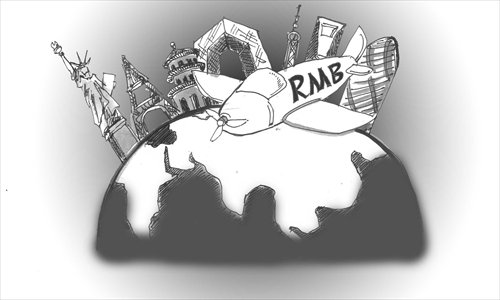HOME >> BUSINESS
Yuan inclusion in SDR basket inevitable
By Zhao Yongsheng Source:Global Times Published: 2015-6-1 19:23:01
Move likely to allow for improved balance

Illustration: Luo Xuan/GT
The IMF is due to re-examine the composition of its currency basket for Special Drawing Rights, a foreign-exchange reserve asset for fund members, later this year. "Our assessment now is that the substantial real effective appreciation [of the yuan] over the past year has brought the exchange rate to a level that is no longer undervalued," the IMF said last week after it concluded its 2015 Article IV Consultation Mission to China.
Does this mean that the yuan is about to be included in the SDR currency basket? We can consider a "signal" sent by IMF Managing Director Christine Lagarde during a speech at Fudan University in Shanghai in March: "It's not a question of if, it's a question of when."
Her speech, and the IMF's announcement, indicate that the yuan is quite likely to be included in the SDR basket when it is reviewed this year.
But merely joining the SDR basket is not the only important step for the yuan, even if it is already a significant development in the currency's internationalization.
Actually, the inclusion of the yuan in the SDR basket is not just a question of "if" or "when," but a question of "how much."
Let's look first at the composition of the SDR basket, which now includes the four strongest currencies in the world: the dollar, euro, yen and British pound.
When the SDR was launched in 1981, the shares for the five currencies in the basket were 42 percent, 19 percent, 13 percent, 13 percent and 13 percent for the dollar, Deutsche mark, French franc, yen and pound, respectively. The basket is adjusted every five years.
Looking at this original composition, we can divide the basket's basic structure into two blocks: the "Deutsche mark-French franc block" (or the "euro block" after the adoption of the European single currency in 2001) and the "dollar-pound-yen block."
This division is based on differences in culture, historical links and even military relationships.
It is true that Germany and France are not the same, as one is a Germanic culture and the other is a French or half-Latin culture.
Nevertheless, these countries had no choice but to work together to establish and expand the European Union. Especially since the birth of the euro, monetary and financial relations between Germany and France have become closer. They are both countries of Europe's continental culture.
For their part, the UK and US share an "Anglo-Saxon" culture, and their relationship is that of siblings. With regard to Japan, it has close links to the US due to its post-WWII occupation and rebuilding by the US. That's why we put these three countries and their currencies together.
Originally, the combined share of the mark and franc was 32 percent.
Even if we assume this European continental culture block increased to 37.4 percent for 2011-15, it would still lag far behind the dollar-pound-yen block, which stands at 62.6 percent for the same period.
How can we maintain balance in the SDR basket?
Balance is essential for any game with multiple players, and that is also true of currency baskets.
In the case of the above division, obviously the gap of 25.2 percentage points between two blocks is too huge to be good for stability.
If we assume a share of 10 percent for the yuan in the SDR basket, the euro plus the yuan will make up 47.4 percent of the basket, against a new share for the dollar-pound-yen block of 52.6 percent. Now, the gap is not so large.
Why do we put the euro and yuan together? This implies the necessity for Europe to find another force to implicitly provide balance against the "American hegemony."
The increasing closeness of Europe and China will be gradually reinforced with the adoption of China's "One Belt, One Road" initiative and the operation of the China-initiated Asian Infrastructure Investment Bank.
This solution can also be a moderate and acceptable reform for the current players in the SDR basket, whatever their position, because even with the new composition, the dollar-pound-yen block will retain a dominant position with 5.2 percentage points more than the euro-yuan block.
Finally, in China's pursuit of inclusion, France will play a major role - and not only because the IMF's president is usually a French national.
It is also because France needs China, probably much more than do other countries, to recover from the lingering effects of the financial crisis and keep its economy growing.
The author is a Paris-based economist and vice-president of the Paris-based China-France Association of Lawyers and Economists. bizopinion@globaltimes.com.cn
Posted in: Expert assessment